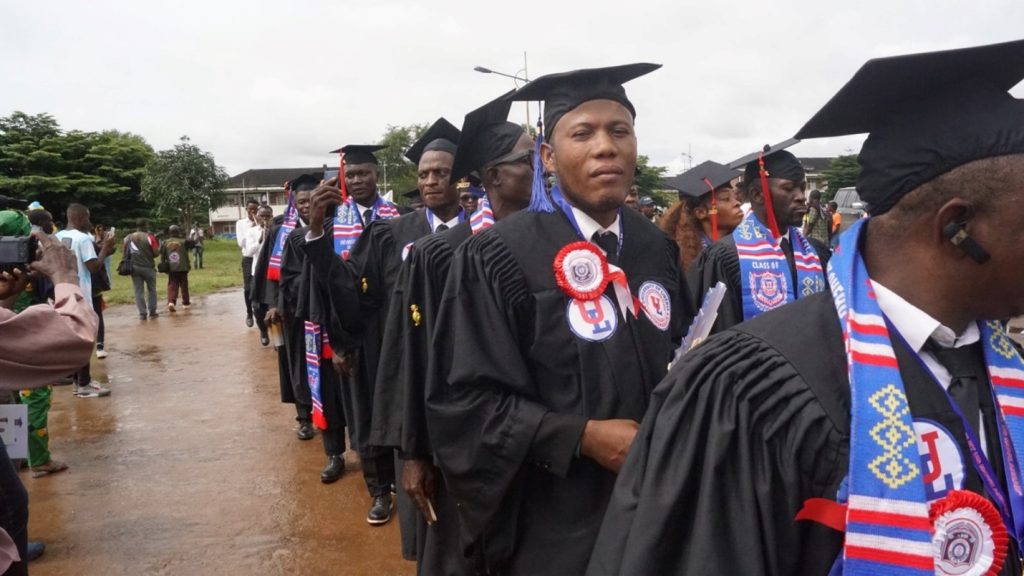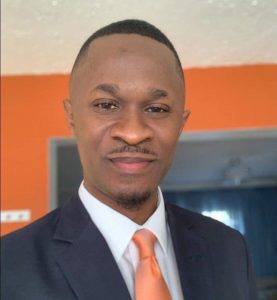African Universities Urged to Promote Peace As UL Kicks Off 104th Commencement Convocation with 330 Graduates from Three Colleges

In his address, Dr. Audi asserted that in an era marked by conflict and inequality, and social unrest, universities have a critical role to play in promoting peace and fostering a culture of understanding and tolerance.
Monrovia – The University of Liberia (UL) has commenced the conferral of degrees at its 104th Commencement Convocation, with call to African universities, including the University of Liberia, to play a pivotal role in promoting of peace and fostering stability in a world that has become increasingly turbulent.
The week-long commencement exercises are currently taking place at the University’s Fendall campus, in Louisiana, Montserrado County.
In a combined ceremony for three colleges, namely, the Amos C. Sawyer College of Social Sciences and Humanities, William V.S. Tubman College of Education, and the College of Gender Studies and Interdisciplinary Research, a total of 330 students graduated, representing the first batch of more than 2,600 candidates expected to graduate from the University of Liberia at the 104th Commencement Convocation.
The William V. S. Tubman College of Education graduated 149, while the Amos C. Sawyer College of Social Sciences and Humanities had 177, and the College of Gender and Interdisciplinary Research had four graduates, the first cohort for the recently established college.
Families, friends, and well-wishers cheered on with palpable excitement and jubilation as the degrees were conferred on the candidates, a protocol which confirmed their new status as graduates of the University of Liberia.
Dr. Ahmed Abubakar Audi, Commandant General of the Nigeria Security and Civil Defense Corps, was the convocation speaker for the three colleges. He spoke on the theme: “The Role of Universities in Promoting Peace in a Turbulent World.”
In his address, Dr. Audi asserted that in an era marked by conflict and inequality, and social unrest, universities have a critical role to play in promoting peace and fostering a culture of understanding and tolerance.
His address, which was delivered in the form of an academic research paper, explores the transformative potential of higher education institutions in addressing the complex challenges facing out global community.
“Universities, as centers of learning and knowledge, have a unique and pivotal role in promoting peace,” Dr. Audi said. “They are not only responsible for educating future leaders but also for conducting research that can inform policies and practices mired at conflict resolution and peace-building.”
He said the African continent presents a complex and diverse landscape when it comes to the state of peace, confronted by significant challenges, ranging from protracted conflicts and civil wars to emerging threats such as terrorism and violent extremism.
Despite the prevalence of conflict on the continent, Dr. Audi said some progress have been made in a number of areas. However, the keynote speaker said universities have traditionally played a significant role in promoting peace through various channels, including education, research, and community engagement.
“These institutions are uniquely positioned to cultivate a culture of peace by fostering critical thinking, encouraging dialogue, and providing the intellectual tools necessary to address the complex and social political challenges,” said Dr. Audi, whose institution, the International Academy for Gender and Peace and the University of Liberia have signed a Memorandum of Understanding to commence postgraduate programs leading to the award of Master of Science (M.Sc) and Doctor of Philosophy (Ph.D) Degrees in Genre and Security Studies.
He said one of the primary ways universities contribute to peace is through education, stating that by offering courses in peace studies, conflict resolution, Gender and Security Studies, and related fields, universities equip students with the knowledge and skills necessary to understand and address the root causes of conflict.
While the keynote speaker recognized that universities have an outsize role to play in fostering peace and resolving conflicts on the African continent and beyond, suggesting that this can be achieved through education and research, community engagement, critical thinking and analysis, he stated, however, that African universities are faced with serious challenges that hinder their efforts towards promoting peace.
He identified some of the major challenges as limited resources and finding, brain drain, political interference, and cultural and linguistic diversity.
Notwithstanding the challenges, Dr. Audi said African universities can promote peace through collaborations and partnerships, community-based initiatives research and policy engagement, and student-led initiatives.
In conclusion, Dr. Audi emphasized that for African universities to promote peace, Governments and international organizations should increase funding for African universities to support peace building efforts.
Additionally, he recommended that universities should develop programs aimed at building the capacity of their staff and students, including professional development opportunities and initiatives to retain skilled academics, endeavor to address the brain drain by creating incentives for academics to remain in Africa, develop inclusive policies and practices, strengthen partnerships and collaborations and promote academic freedom.
In his special remarks, Prof. Dr. Al-Hassan Conteh, Acting President of the University of Liberia, encouraged the graduates to represent their alma mater to the fullest and to the best of their ability, challenging the graduates to “go out and shine, make a difference, demonstrate professionalism and productivity, and brighten the light.”
“Congratulations on your hard work over the past years. I know the road has been rough, and the journey has been challenging, but through the unique Grace and Mercy of the Almighty God, you have made it through. You have kept the touch burning. You survived and sustained yourselves through the challenges and obstacles you faced as a student at the of university of Liberia,” said Dr. Conteh, who is presiding over this commencement as one of five transitional mandates entrusted to him as Acting President by the Visitor of the University, His Excellency President Joseph N. Boakai, President of the Republic of Liberia.
He thanked the Keynote Speaker, Dr. Ahmed Abubakar Audi and delegation for honoring the invitation to attend the 104th Commencement Convocation.
“I thank you heartily and would like you to know that we value your partnership and look forward to working with you to advance our curriculum in gender studies, international security, and research,” he said.
During the program, Associate Professor Dr. Josephus Gray, Dean of the Amos C. Sawyer College of Social Sciences and Humanities, admonished the graduates, saying “they are in a strong position to be of service to their parents, family, community, institution, and the entire country.”
“I urge you to serve as true ambassadors, listen more and talk less. Remember that the best way to learn and grow is to take the risk of being wrong,” he noted.
The Valedictorian, Mr. Amadou L. Sayon, noted that the University of Liberia has a proud legacy of producing great men and women who have not only
excelled on the world stage, but have also upheld the values of academic excellence, social responsibility, and leadership, adding that the UL has given them the tools they need to engage in critical thinking and lead with integrity.
The post African Universities Urged to Promote Peace As UL Kicks Off 104th Commencement Convocation with 330 Graduates from Three Colleges appeared first on FrontPageAfrica.




